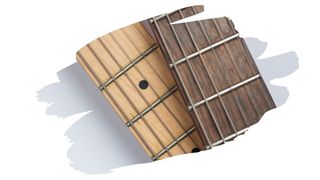Finishing a guitar neck can be a bit tricky. Your finish will determine how well your guitar handles being played everyday. It can be the difference between a satin or a glossy look. It can even effect how smoothly your hand can glide along the neck.
Still, if you want an all-purpose guitar finish that will give you the right balance between protection, appearance, and smoothness, then Danish oil should be right up your street.
Danish oil is made up of Linseed oil and/or Tung oil, mixed with varnish. This mix is then thinned out by adding mineral spirits into it.
What you end up with is a finish that dries faster than a natural oil. And it leaves behind a thinner resin coat, (than a natural oil), on the surface of wood too.
Related Post: Danish Oil Not Drying? What You Need To Know To Avoid Disaster!
So, if you apply Danish oil onto a guitar neck, what do you get?
Danish oil is a penetrating oil that’ll give your guitar a satin looking finish that really showcases the wood grain underneath. Feeling silky smooth to the touch, Danish oil will darken the wood slightly (due to the Linseed oil found in most Danish oil products).
However, it doesn’t yellow with age like linseed oil. But, a Danish oil finish may need some kind of wipe-on poly top coat to seal and protect it, as this finish isn’t very durable if handled frequently. All of which means that a Danish oil finish should go great on that guitar neck.
But, as you’ll soon discover below, if you want to condition (rather than finish) your guitar, then Danish oil is a finish best avoided…

This post may contain affiliate links to products that we receive a commission for (at no additional cost to you). Learn more here.
First Off, What Kind Of Oil Do You Use On A Guitar Neck?
When you want to finish the neck of a guitar, you should use a drying oil.
Drying oils, are oils that will soak into wood, but will leave a little bit of film behind on the surface. Once that film dries and cures, it turns into a hard resin.
Drying oils, like Linseed oil and Tung oil will do a great job of this. They are naturally sourced, and have been used for centuries to protect wood from decay.
Drying oil blends, like Tru-oil, Teak oil and Danish oil are also superb penetrating oils too. Most of these oil blends use Linseed as their base ingredient. And they have additional varnish/thinners which help them dry faster than a pure natural oil finish.
Related Post: Can Tru-Oil Really Finish And Protect Your Maple Fretboard?

What About The Fretboard? Can You Use Danish Oil On A Guitar Fretboard?
If you simply want to finish a fretboard, then you can use Danish oil to seal it.
However, if you want to oil and condition an unfinished fretboard, then do not use Danish oil for this.
Oiling a fretboard with Danish oil will add another layer of hard resin on top of it.
This is a problem, because a conditioning oil is simply meant to rehydrate wood. It should not seal and finish timber.
If you want to condition a fretboard, you should use what is referred to in the wood finishing world as a ‘non-drying’ oil.
Non-drying oils, like Mineral oil, will soak into wood too. However, they do not build up the surface. And they will not dry and cure into a hard resin.
Which means, that if you want to condition your fretboard, you should use 100% food grade pure Mineral oil.
Mineral oil is the main ingredient in a lot of fretboard oil products. And it is this stuff that’s doing all of the hard work of rehydrating that fretboard. Lemon oil fretboard products are just mineral oil with lemon oil droplets added to it).
Related Post: Deciding Between Lemon Oil Vs Tung Oil For Your Fretboard
But, Doesn’t Danish Oil Darken Wood?
It depends whether it is a Linseed oil blend or Tung oil blend.
All oil finishes will darken wood to a certain extent (kind of like how raw wood will darken when you put a little water on it).
However, pure Tung oil won’t darken wood beyond that. So, a Danish oil with pure Tung oil as its main natural oil ingredient, shouldn’t discolor wood.
But, if linseed oil is the base ingredient of that Danish oil product, then it can significantly darken the wood of that guitar neck, (since this is what Linseed oil does naturally anyway).

OK, That Means Danish Oil Is Suitable Even On A Maple Guitar Neck, Right?
Yep, it’ll go on fine on a maple guitar neck. A clear coat of Danish oil will turn out great once rubbed right into that timber.
However, it’s worth pointing out here that, maple wood is notoriously difficult to stain. It’s super-tight wood pores don’t leave much room for color-changing stains to soak evenly into it.
You see, wood stains soak into timber surfaces just like oil finishes do. However, stains only work by soaking into wood fibers – they do not build up on the surface like a drying oil.
Now, while a drying oil may struggle to soak right down into maple, (just like wood stain), that won’t prevent it from coating the outside of wood in a hard film. So, it can still do the job of protecting maple wood all the same.
But, if that drying oil has had a pigment color added to it, trying to apply a ‘stained’ Danish oil product could be problematic. As in that ‘stained’ Danish oil coat will look splotchy and uneven when applied onto maple wood.
To put it simply, some sections will have a deeper hue than other sections (due to the uneven soaking). Which means that if you are going to put Danish oil onto a maple guitar neck, stick to using a clear coat version.
To Wrap Up…
If you want to give that guitar neck a satin appearance that really enhances the look of your guitars natural wood grain, then Danish oil is perfect for the job.
Simply stick to applying very thin coats of Danish oil, using a lint-free cloth, and let it really soak in.
But, avoid using a brush to apply this stuff. Smearing Danish oil on with a brush will only end up coating it on too thickly.
And, as long as you rub away all excess oil between coats, a dry and cured Danish oil finish won’t weigh down the feel of your guitar as you play.



